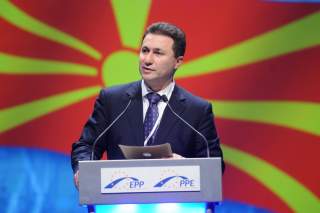The Most Paranoid Country in Europe
Macedonia’s democracy has been hardwired to keep Nikola Gruevski in power.
The wiretaps have revealed that the principle designer of “Skopje 2014” was of course Gruevski himself. “Baroque is one thing, Classicism is another,” he lectures a minister in one recording. “These buildings we saw on our trip to Washington were Classical and the pillars we will have at the Constitutional Court, those are baroque.” Nearly three years past deadline, “Skopje 2014” will cost the average Macedonian two months’ salary by its completion. It doubles as a massive kickback program for VMRO. Construction contracts were tendered to chief party contacts. Gruevski exploited the subjectivity of art to enrich himself. “The point of art is that you can’t put a price on it,” a student activist named Ivana told me at an anti-Gruevski rally in May. “Nation building is your tool for money laundering!” was emblazoned on her poster. “VMRO can charge the state 2 million euros for a 500-thousand-euro fountain and pocket the discrepancy.” The wiretaps have revealed that Gruevski typically solicits 5 percent in kickbacks from construction projects, which would put his profits from “Skopje 2014” at approximately 50 million euros.
Quo vadis, Macedonia? Over the last ten years, the decisionmaking and revenue of the state has become overwhelmingly centralized in Skopje. Several kilometers to the north and west, hills of ethnic Albanians boast little more than crime and roads the state has never bothered to pave; their tax dollars go instead to a capital that has been extravagantly architected to make them feel like strangers in their own country. Many Albanians I met—not just peasants, but activists, journalists and professors in cities like Tetovo and Gostivar—quietly recalled 2001, when they could have destroyed Macedonia. By 2025 the Albanian population is expected to surpass that of the Slavic Macedonians. One wonders what settling of scores may be in order.
On the international scene, today Macedonia really is isolated. The balance in sympathy on the name issue, which had generally been on Skopje’s side for twenty years, now tilts unquestionably towards Athens. Reversing this will require redemolishing central Skopje, even as construction of “Skopje 2014” remains ongoing; there are Macedonians who talk openly of doing this. As far as the EU is concerned, Brussels has been curiously disengaged ever since it forced Gruevski from power last June: as thousands of protestors continue to march nightly in Skopje pleading for the EU to help fix the democratic apparatuses it watched Gruevski disable, they are met with blunt statements about Macedonians’ need to sort out their crises themselves. Some civic activists I met blamed the refugee crisis and the “stability argument” for this. Why else has Gruevski been allowed to run the state for the last year as a private citizen? Others thought that the EU had lost the political will to be the caretaker of a country that will soon have the finances of Greece. In July, Brussels abruptly withdrew 30 million euros it had previously allocated to reforming Macedonia’s ministries of justice and public finance. This seemed less an indictment of Macedonian political elites than a rebuff to the tens of thousands of Macedonians who see the EU as the only solution to their crisis. Still, the most telling sign about Macedonia’s place in the world today may yet be Vladimir Putin, who has shown little interest in scoring even a thin propaganda victory by shepherding Macedonia, however disingenuously, towards the Eurasian Customs Union. Whereas Moldova is worth a high degree of plotting and subterfuge on the part of Moscow, Macedonia was determined long ago not worth the trouble.
Alexander Clapp is a journalist who lives in Kiev. His work has appeared in the Balkanist and the Times Literary Supplement.
Image: Nikola Gruevski speaking. European People’s Party, CC BY 2.0.

